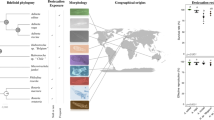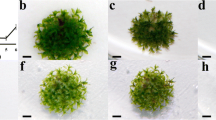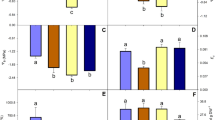Abstract
Exceptional resistance to dehydration allows species of bdelloid rotifers to tolerate desiccation stress in unpredictable habitats. The roles of exogenous and endogenous factors in resistance to short-term dehydration were investigated in Rotaria rotatoria to better understand this capacity among bdelloid rotifers. As the dehydration period was increased and the relative humidity (RH) was reduced, the proportion of rotifers active after the dehydration period decreased. The RH and dehydration period substantially influenced the recovery rate of R. rotatoria under rehydration for 1 h but had less effect under 12-h or 24-h rehydration treatment. The recovery rate was lower in rotifers subjected to a long dehydration period and short rehydration time, but improved by shortening the dehydration period and extending the rehydration treatment. Strain ZJ27 showed higher survivability than strain HX8, appropriate to their habitat near the sea in a region where drought and tropical rainstorms are frequent. Accordingly, species or strains originating from different climate regions and habitats will have experienced different frequencies of desiccation over their adaptive evolutionary history, resulting in varying levels of resistance among species. In addition, RH is shown to be a key factor in resistance to desiccation.



Similar content being viewed by others
Data availability
The data that support the findings of this study are available on request.
References
Arkhipova, I. & M. Meselson, 2000. Transposable elements in sexual and ancient asexual taxa. Proceedings of the National Academy of Sciences of the United States of America 97: 14473–14477. https://doi.org/10.1073/pnas.97.26.14473.
Bohonak, A. J. & D. G. Jenkins, 2003. Ecological and evolutionary significance of dispersal by freshwater invertebrates. Ecology Letters 6: 783–796. https://doi.org/10.1046/j.1461-0248.2003.00486.x.
Caprioli, M. & C. Ricci, 2001. Recipes for successful anhydrobiosis in bdelloid rotifers. Hydrobiologia 446–447: 13–17. https://doi.org/10.1023/A:1017556602272.
Cheng, X. L., J. P. Cubino, K. Balfour, Z. X. Zhu & H. F. Wang, 2022. Drivers of spontaneous and cultivated species diversity in the tropical city of Zhanjiang, China. Urban Forestry & Urban Greening 67: 127428. https://doi.org/10.1016/j.ufug.2021.127428.
Cheng, X. L., M. M. Nizamani, C. Y. Jim, S. Qureshi, S. Liu, Z. X. Zhu, S. S. Wu, K. Balfour & H. F. Wang, 2022b. Response of urban tree DBH to fast urbanization: case of coastal Zhanjiang in south China. Urban Ecosystems 25: 511–522. https://doi.org/10.1007/s11252-021-01167-7.
Crowe, J. H., 1971. Anhydrobiosis: an unsolved problem. American Naturalist 105: 563–573. https://doi.org/10.1086/282745.
Crowe, J. H. & K. A. Madin, 1974. Anhydrobiosis in tardigrades and nematodes. Transactions of the American Microscopical Society 93: 513–524. https://doi.org/10.2307/3225155.
Crowe, J. H. & K. A. Madin, 1975. Anhydrobiosis in nematodes: evaporative water loss and survival. Journal of Experimental Zoology 193: 323–333. https://doi.org/10.1002/jez.1401930308.
Crowe, J. H., F. A. Folkert & L. M. Crowe, 1992. Anhydrobiosis. Annual Review of Physiology 54: 579–599. https://doi.org/10.1146/annurev.ph.54.030192.003051.
Denekamp, N. Y., R. Reinhardt, M. Kube & E. Lubzens, 2010. Late embryogenesis abundant (LEA) proteins in nondesiccated, encysted, and diapausing embryos of rotifers. Biology of Reproduction 82: 714–724. https://doi.org/10.1095/biolreprod.109.081091.
Donner, J., 1965. Ordnung Bdelloidea (Rotatoria, Rädertiere), Akademie Verlag, Berlin:
Eyres, I., C. Boschetti, A. Crisp, T. P. Smith, D. Fontaneto, A. Tunnacliffe & T. G. Barraclough, 2015. Horizontal gene transfer in bdelloid rotifers is ancient, ongoing and more frequent in species from desiccating habitats. BMC Biology 13: 90. https://doi.org/10.1186/s12915-015-0202-9.
Fontaneto, D., E. A. Herniou, T. G. Barraclough, C. Ricci & G. Melone, 2007. On the reality and recognisability of asexual organisms: morphological analysis of the masticatory apparatus of bdelloid rotifers. Zoologica Scripta 36: 361–370. https://doi.org/10.1111/j.1463-6409.2007.00281.x.
Gilbert, J. J., 1974. Dormancy in Rotifers. Transactions of the American Microscopical Society 93: 490–513. https://doi.org/10.2307/3225154.
Gladyshev, E. A., M. Meselson & I. R. Arkhipova, 2008. Massive horizontal gene transfer in bdelloid rotifers. Science 320: 1210–1213. https://doi.org/10.1126/science.1156407.
Hespeels, B., M. Knapen, D. Hanot-Mambres, A.-C. Heuskin, F. Pineux, S. Lucas, R. Koszul & K. van Doninck, 2014. Gateway to genetic exchange? DNA double-strand breaks in the bdelloid rotifer Adineta vaga submitted to desiccation. Journal of Evolutionary Biology 27: 1334–1345. https://doi.org/10.1111/jeb.12326.
Hickernell, L. M., 1917. A study of desiccation in the rotifer Philodina roseola, with special reference to cytological changes accompanying desiccation. Biological Bulletin 32: 343–407.
Higa, L. M. & C. Z. Womersley, 1993. New insights into the anhydrobiotic phenomenon: the effect of trehalose content and differential rates of evaporative water loss on the survival of Aphelenchus avenae. Journal of Experimental Zoology 267: 120–129. https://doi.org/10.1002/jez.1402670205.
Hinz, C., W. H. Ahlrichs & O. R. P. Bininda-Emonds, 2018. Immediate and heritable costs of desiccation on the life history of the bdelloid rotifer Philodina roseola. Organisms Diversity & Evolution 18: 399–406. https://doi.org/10.1007/s13127-018-0379-1.
Jacobs, M. H., 1909. The effects of desiccation on the rotifer Philodina roseola. Journal of Experimental Zoology 6: 207–263.
Janis, B., C. Belott & M. A. Menze, 2018. Role of intrinsic disorder in animal desiccation tolerance. Proteomics 18: 1800067. https://doi.org/10.1002/pmic.201800067.
Katoh, K., J. Rozewicki & K. D. Yamada, 2017. MAFFT online service: multiple sequence alignment, interactive sequence choice and visualization. Briefings in Bioinformatics 20: 1160–1166. https://doi.org/10.1093/bib/bbx108.
Kimura, M., 1980. A simple method for estimating evolutionary rate of base substitutions through comparative studies of nucleotide sequences. Journal of Molecular Evolution 16: 111–120. https://doi.org/10.1007/BF01731581.
Lapinski, J. & A. Tunnacliffe, 2003. Anhydrobiosis without trehalose in bdelloid rotifers. FEBS Letters 553: 387–390. https://doi.org/10.1016/S0014-5793(03)01062-7.
Li, S. H., H. Zhu, Y. Z. Xia, M. J. Yu, K. E. Lin, K. S. Liu, Z. Y. Yue & Y. X. Chen, 1959. The mass culture of unicellular green algae. Acta Hydrobiologia Sinica 4: 462–472.
Mark Welch, D. B. & M. Meselson, 2000. Evidence for the evolution of bdelloid rotifers without sexual reproduction or genetic exchange. Science 288: 1211–1215. https://doi.org/10.1126/science.288.5469.1211.
Mark Welch, D. B. & M. Meselson, 2003. Oocyte nuclear DNA content and GC proportion in rotifers of the anciently asexual class Bdelloidea. Biological Journal of the Linnean Society 79: 85–91. https://doi.org/10.1046/j.10958312.2003.00180.x.
Mark Welch, D. B., M. P. Cummings, D. M. Hillis & M. Meselson, 2004a. Divergent gene copies in the asexual class Bdelloidea (Rotifera) separated before the bdelloid radiation or within bdelloid families. Proceedings of the National Academy of Sciences of the United States of America 101: 1622–1625. https://doi.org/10.1073/pnas.2136686100.
Mark Welch, J. L., D. B. Mark Welch & M. Meselson, 2004b. Cytogenetic evidence for asexual evolution of bdelloid rotifers. Proceedings of the National Academy of Sciences of the United States of America 101: 1618–1621. https://doi.org/10.1073/pnas.0307677100.
Marotta, R., F. Leasi, A. Uggetti, C. Ricci & G. Melone, 2010. Dry and survive: morphological changes during anhydrobiosis in a bdelloid rotifer. Journal of Structural Biology 171: 11–17. https://doi.org/10.1016/j.jsb.2010.04.003.
Marotta, R., A. Uggetti, C. Ricci, F. Leasi & G. Melone, 2012. Surviving starvation: changes accompanying starvation tolerance in a bdelloid rotifer. Journal of Morphology 273: 1–7. https://doi.org/10.1002/jmor.11000.
Montero-Pau, J., A. Gómez & J. Muñoz, 2008. Application of an inexpensive and high-throughput genomic DNA extraction method for the molecular ecology of zooplanktonic diapausing eggs. Limnology and Oceanography: Methods 6: 218–222. https://doi.org/10.4319/lom.2008.6.218.
Nkwonkam, M. C. G., 2012. Molecular responses of the bdelloid rotifer Philodina roseola to dehydration. Dusseldorf: Dissertation in Heinrich-Heine-Universität Düsseldorf. https://docserv.uni-duesseldorf.de/servlets/DerivateServlet/Derivate-27659/Dissertation%20finish%20PDF_A.pdf.
Peltier, W. H. & C. I. Weber, 1985. Methods for Measuring the Acute Toxicity of Effluents to Freshwater and Marine Organisms, 3rd edn. United States Environmental Protection Agency, Cincinnati: 23 pp. https://www.epa.gov/.
Poinar, G. O. & C. Ricci, 1992. Bdelloid rotifers in Dominican amber: evidence for parthenogenetic continuity. Cellular and Molecular Life Sciences 48: 408–410. https://doi.org/10.1007/bf01923444.
Pouchkina-Stantcheva, N. N., B. M. McGee, C. Boschetti, D. Tolleter, S. Chakrabortee, A. V. Popova, F. Meersman, D. Macherel, D. K. Hincha & A. Tunnacliffe, 2007. Functional divergence of former alleles in an ancient asexual invertebrate. Science 318: 268–271. https://doi.org/10.1126/science.114436.
Rebecchi, L., R. Guidetti, S. Borsari, T. Altiero & R. Bertolani, 2006. Dynamics of long term anhydrobiotic survival of lichen-dwelling tardigrades. Hydrobiologia 558: 23–30. https://doi.org/10.1007/s10750-005-1415-7.
Ricci, C., 1987. Ecology of bdelloids: how to be successful. In: May, L., R. Wallace & A. Herzig (eds.), Rotifer Symposium IV. Hydrobiologia 147: 117–127. https://doi.org/10.1007/978-94-009-4059-8_17.
Ricci, C., 1998. Anhydrobiotic capabilities of bdelloid rotifers. Hydrobiologia 387: 321–326. https://doi.org/10.1023/A:1017086425934.
Ricci, C., 2017. Bdelloid rotifers: ‘Sleeping beauties’ and ‘evolutionary scandals’, but not only. Hydrobiologia 796: 277–285. https://doi.org/10.1007/s10750-016-2919-z.
Ricci, C. & M. Caprioli, 1998. Stress during dormancy: effect on recovery rates and life-history traits of anhydrobiotic animals. Aquatic Ecology 32: 353–359. https://doi.org/10.1023/A:1009905404868.
Ricci, C. & M. Caprioli, 2005. Anhydrobiosis in bdelloid species, populations and individuals. Integrative and Comparative Biology 45: 759–763. https://doi.org/10.1093/icb/45.5.759.
Ricci, C. & C. Covino, 2005. Anhydrobiosis of Adineta ricciae: Costs and benefits. Hydrobiologia 546: 307–314. https://doi.org/10.1007/s10750-005-4238-7.
Ricci, C. & D. Fontaneto, 2009. The importance of being a bdelloid: ecological and evolutionary consequences of dormancy. Italian Journal of Zoology 76: 240–249. https://doi.org/10.1080/11250000902773484.
Ricci, C. & G. Melone, 2000. Key to the identification of the genera of bdelloid rotifers. Hydrobiologia 418: 73–80. https://doi.org/10.1023/A:1003840216827.
Ricci, C., G. Melone, N. Santo & M. Caprioli, 2003. Morphological response of a bdelloid rotifer to desiccation. Journal of Morphology 257: 246–253. https://doi.org/10.1002/jmor.10120.
Ricci, C., M. Caprioli & N. Santo, 2004. Feeding and anhydrobiosis in bdelloid rotifers: a preparatory study for an experiment aboard the International Space Station. Invertebrate Biology 123: 283–288. https://doi.org/10.1111/j.1744-7410.2004.tb00162.x.
Ricci, C., M. Caprioli & D. Fontaneto, 2008. Volume and morphology changes of a bdelloid rotifer species (Macrotrachela quadricornifera) during anhydrobiosis. Journal of Morphology 269: 233–239. https://doi.org/10.1002/jmor.10579.
Rice, W. R. & U. Friberg, 2007. Genomic clues to an ancient asexual scandal. Genome Biology 8: 232–235. https://doi.org/10.1186/gb-2007-8-12-232.
Rivas, J. A., Jr., J. E. Mohl, R. S. van Pelt, M.-Y. Leung, R. L. Wallace, T. E. Gill & E. J. Walsh, 2018. Evidence for regional aeolian transport of freshwater micrometazoans in arid regions. Limnology and Oceanography Letters 3: 320–330. https://doi.org/10.1002/lol2.10072.
Shi, P., W. Xu & J. Wang, 2016. Natural disaster system in China. In Shi, P. (ed), Natural Disasters in China. IHDP/Future Earth-Integrated Risk Governance Project Series. Springer, Berlin. https://doi.org/10.1007/978-3-662-50270-9_1.
Thompson, J. D., T. J. Gibson, F. Plewniak, F. Jeanmougin & D. G. Higgins, 1997. The Clustal-X windows interface: flexible strategies for multiple sequences alignment aided by quality analysis tools. Nucleic Acids Research 25: 4876–4882. https://doi.org/10.1093/nar/25.24.4876.
Tunnacliffe, A., J. Lapinski & B. McGee, 2005. A putative LEA protein, but no trehalose, is present in anhydrobiotic bdelloid rotifers. Hydrobiologia 546: 315–321. https://doi.org/10.1007/s10750-005-4239-6.
Vilenchik, M. M. & A. G. Knudson, 2003. Endogenous DNA double strand breaks: production, fidelity of repair, and induction of cancer. Proceedings of the National Academy of Sciences of the United States of America 100: 12871–12876. https://doi.org/10.1073/pnas.2135498100.
Wallace, R. L., T. W. Snell & H. A. Smith, 2015. Phylum Rotifera. In Thorp, J. H. & D. C. Rogers (eds), Thorp and Covich’s freshwater invertebrates Elsevier, Waltham: 225–271. https://doi.org/10.1016/B978-0-12-385026-3.00013-9.
Wharton, D. A., 2015. Anhydrobiosis. Current Biology 25: 1114–1116. https://doi.org/10.1016/j.cub.2015.09.047.
Wilson, C. G., 2011. Desiccation-tolerance in bdelloid rotifers facilitates spatiotemporal escape from multiple species of parasitic fungi. Biological Journal of the Linnean Society 104: 564–574. https://doi.org/10.1111/j.1095-8312.2011.01737.x.
Wilson, C. G. & P. W. Sherman, 2010. Anciently asexual bdelloid rotifers escape lethal fungal parasites by drying up and blowing away. Science 327: 574–576. https://doi.org/10.1126/science.1179252.
Womersley, C. Z., D. A. Wharton & L. M. Higa, 1998. Survival biology. In Perry, R. N. & D. J. Wright (eds), The Physiology and Biochemistry of Free-Living and Plant-Parasitic Nematodes CABI Publishing, Wallingford: 271–302.
Wright, J. C., 2001. Cryptobiosis 300 years on from van Leuwenhoek: What have we learned about tardigrades? Zoologischer Anzeiger 240: 563–582. https://doi.org/10.1078/0044-5231-00068.
Wright, J. C., P. Westh & H. Ramløv, 1992. Cryptobiosis in Tardigrada. Biological Reviews 67: 1–29. https://doi.org/10.1111/j.1469-185X.1992.tb01657.x.
Xiang, X. L., Y. L. Xi, X. L. Wen, G. Zhang, J. X. Wang & K. Hu, 2011. Genetic differentiation and phylogeographical structure of the Brachionus calyciflorus complex in eastern China. Molecular Ecology 20: 3027–3044. https://doi.org/10.1111/j.1365-294x.2011.05147.x.
Xiang, X. L., Y. Y. Chen, Q. L. Xu, L. Y. Zhu, X. L. Wen & Y. L. Xi, 2017. Combined effects of temperature and the microcystin MC-LR on the feeding behavior of the rotifer Brachionus calyciflorus. Bulletin of Environmental Contamination and Toxicology 99: 493–499. https://doi.org/10.1007/s00128-017-2172-9.
Acknowledgements
XX, CW, and YX participated in the conception and design of the study; CW contributed to the collection of samples; CW, LH, LZ, JX, XW, and XX analyzed the data and drafted the manuscript. All authors have read and approved the manuscript. Cynthia Kulongowski with Liwen Bianji (Edanz) (www.liwenbianji.cn) assisted with editing the language of a draft of this manuscript.
Funding
This research was funded by the Natural Science Foundation of China (31872208), the Natural Science Foundation of Anhui Province (2308085MC72), the University Synergy Innovation Program of Anhui Province (GXXT-2020-075) and the Natural Science Foundation in College of Anhui Province (KJ2020A0632).
Author information
Authors and Affiliations
Corresponding author
Ethics declarations
Conflict of interest
The authors declare that they have no conflict of interests in relation to this work.
Informed consent
All authors reviewed the manuscript and agreed with its contents.
Additional information
Publisher's Note
Springer Nature remains neutral with regard to jurisdictional claims in published maps and institutional affiliations.
Guest editors: Maria Špoljar, Diego Fontaneto, Elizabeth J. Walsh & Natalia Kuczynska-Kippen / Diverse Rotifers in Diverse Ecosystems
Rights and permissions
Springer Nature or its licensor (e.g. a society or other partner) holds exclusive rights to this article under a publishing agreement with the author(s) or other rightsholder(s); author self-archiving of the accepted manuscript version of this article is solely governed by the terms of such publishing agreement and applicable law.
About this article
Cite this article
Xiang, X., Wang, C., Huang, L. et al. The resistance to short-term dehydration in the bdelloid rotifer Rotaria rotatoria from different climate regions. Hydrobiologia (2023). https://doi.org/10.1007/s10750-023-05375-4
Received:
Revised:
Accepted:
Published:
DOI: https://doi.org/10.1007/s10750-023-05375-4




